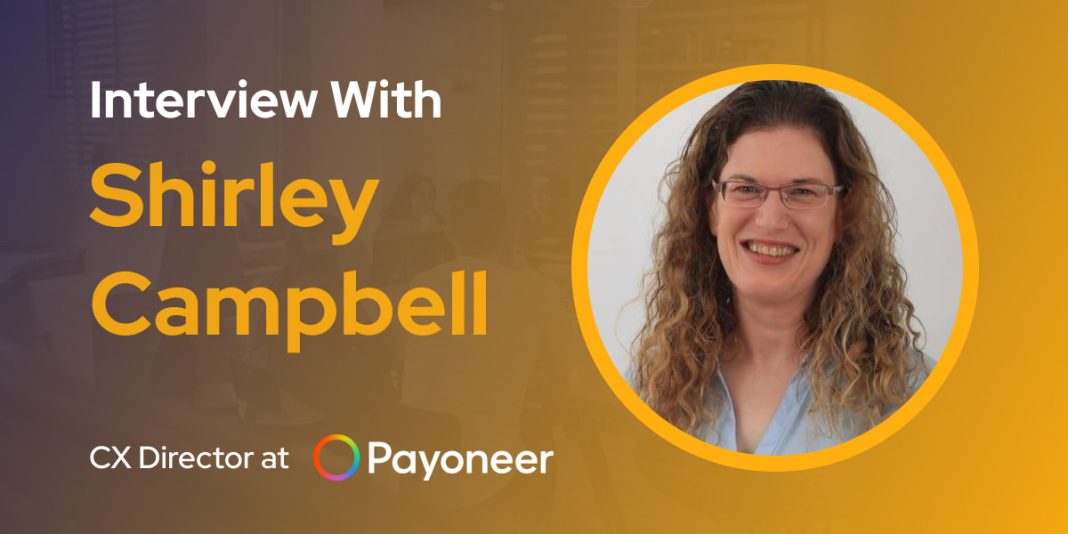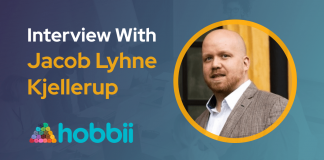Hi Shirley, tell us about yourself and your background.
I’m a customer experience expert with more than 15 years of CX management experience in various industries, including both B2B and B2C companies. Ever since I was 19, I’ve used some version of the phrase: “Hello this is Shirley from company X speaking, how can I assist you today?”, which means I’ve been in the field of customer service and customer experience for more than half of my life. I consider CX not only as my profession but also as my passion, and some would even say my obsession.
Currently, I’m the CX Director for Payoneer, the world’s go-to partner for digital commerce. I have a master’s degree in Business and a bachelor’s in Psychology & Education, and in general considering myself as a life-long learner.
When I’m not working, studying, or raising my three adorable kids (a sixteen-year-old and eight-year-old twins), I enjoy writing, singing, and watching a lot of TV series. I stopped counting how many I follow a long time ago.
How did you start working in the customer experience space?
As I mentioned before, I began this CX journey when I was 19. My first role was as a call-center advisor. Others had it as a temporary job while they were in university, but for me it felt like I found that one thing I’m good at and that fulfills me. I was able to connect with customers easily and see things through their eyes, thus allowing me to not only resolve their issues but also identify areas for improvements for the sake of other customers. I realized fifteen years ago, customer service is only one of the touchpoints a customer has with a company, and that I can bring impact to other touchpoints as well. I love the fact that a CX leader can implement a customer-centric mindset cross the company. For me, joining Payoneer as the CX Director is a new adventure. It allows me to combine CX expertise on digital, B2B, global and hi-tech all at the same time.
Can you tell us a little bit about your current role?
I think the best way to explain a CX Director position is to simply say my job is to demonstrate to others the CX mindset and how to implement customer-focused behaviors in daily workplace routines. I think of myself as a lighthouse that needs to guide ‘ships’ that carry customers through different customer journeys. I need to highlight the potential danger that can harm the experience, and point towards the path that will enhance trust and loyalty. My role is such that in every decision we’re about to make, I will know for sure someone asked our customers if this is what they need, want, and how they feel about it. Moreover, Payoneer is truly investing in employee experience and, knowing how EX is a crucial part of CX, I love the fact I get in my role to collaborate with teams around this topic and make the experience (CX or EX) commonplace for all.
How can companies better listen and understand their customer base?
Two things. First, when a customer is raising a complaint there is a tendency of handling this one specific case as quickly as possible, so the customer is happy and the noise the complaint created internally is gone. I think this is a place of opportunity. If we put most of our efforts on the root-cause, it will help us prevent a much higher number of complaints from those customers who decided not to share the same problem with us. Their silence is not a good sign, and we can make an impact here. Second, when customers send a complaint, call us, or even post on our social media assets they are “talking about us with us”. I believe companies must invest time and effort into “talking about us without us,” where customers talk about our brand experience and we’re not leading the conversation. We need to be in the ratings websites, social media groups or any other places – and make ourselves available to hear their voice.
What are some companies that you think are doing an excellent job at customer experience, and why?
I recently gave a lecture about CX and asked the participants to share the companies they would give a 9 or 10 in an NPS survey. I was not surprised to see people are mentioning some companies we are all familiar with – I think we are already programmed in a way to think about these companies as the super-model of CX. If you try to find the factor that is common to all these companies, it would probably be the way they are personalizing the experience and that they make their customers feel they can predict their needs. So, any company that take their CX to that level is doing an excellent job in my opinion. I would like to emphasize that all companies in all sizes and shapes can deliver excellent CX and making a commitment to get your CX to the next level and take actions to enhance it, from my perspective, is already doing an excellent job. Not all companies have this to begin with. All companies have the potential of becoming ‘Netflix’, ‘Disney’, ‘Amazon’ or any other company that you can think of with excellent CX. It starts with a commitment that is followed by behaviors that show the commitment is so much more than words. It’s a culture.
Many companies are currently undergoing digital transformation processes – what are your tips on a successful digital transformation?
First, transformation is something that starts and ends. Therefore, I don’t like to call it transformation but evolution. We keep evolving our digital proposal to our customers knowing that what is now unique and exceptional, tomorrow is just a basic – so we need to be in continuous motion. My second tip is to never assume digital is the preferable channel for customers to communicate with a company. Don’t plan to divert them from phone calls, for example, to chats or chat-bots when they seek support. Make all efforts to open as many channels as you can for your customers, so you communicate with them in their preferable platform, but remember to give them a choice. Digital CX for me is all about choice and democratization in every decision. Payoneer is built around this concept: a world of financial opportunities is now open to customers thanks to the digital era we live in. Going back to my advice, customers have, in a certain point of the journey, a junction with multiple options. They get to choose the best option for them at that specific time. It might be a different choice tomorrow, so we need to be ready and available for tomorrow’s choice as well.
What are some CX solutions or tools that you’re keeping your eyes on right now?
Like any other field in business, we must always begin with the ‘why’ and ‘what’ before the ‘how.’ Meaning, technology for me is only the tool to track, measure and execute the CX. A lot of companies implement state-of-the-art CX tools, but they don’t use them to the max because their strategy is coming after technology instead of the other way around. One of our main challenges in CX is to deliver personalized customer journeys. Within regulated industries like fintech and B2B, it’s an even greater challenge. Tools that assist with this are ones I’m keeping my eyes on, but they must demonstrate the ability to merge X-Data and O-Data in ways I couldn’t have done otherwise. Probably AI or text analysis based.
Did you read any interesting books this past summer that you’d like to recommend?
I’ve decided to share with you the book of Lori Gottlieb, Maybe you should talk to someone. If you haven’t read it yet, it’s the true story about Gottlieb, an experienced therapist, and her relationship with her patients and with her own therapist Randel. What I love about the book is the way she makes us realize that at the end of the day we are humans who interact with other humans, and basically what we want out of interactions is to be heard, seen, and validated for our feelings. I think this is CX in a nutshell. Even if we, as a company, are a business and even if the other side, our customer, is a business, at the end of the day we are talking about human-to-human interactions that involve expectations, experiences, and emotions.
What is your favorite CX metric?
There are many CX metrics out there and I’ve probably used them all at some point or another. The best practice is to measure a few of them at the same time, so I do this and look for correlations between them. I think the one I truly like is trust. I recently read about HX TrustID (by Deloitte). I feel it reflects my vision of what we should measure in human experiences: Humanity, Transparency, Capability & Reliability. In general, it represents a metric that is based on dimensions, and metrics that are measuring more than one angle of the experience are always the ones I prefer.






